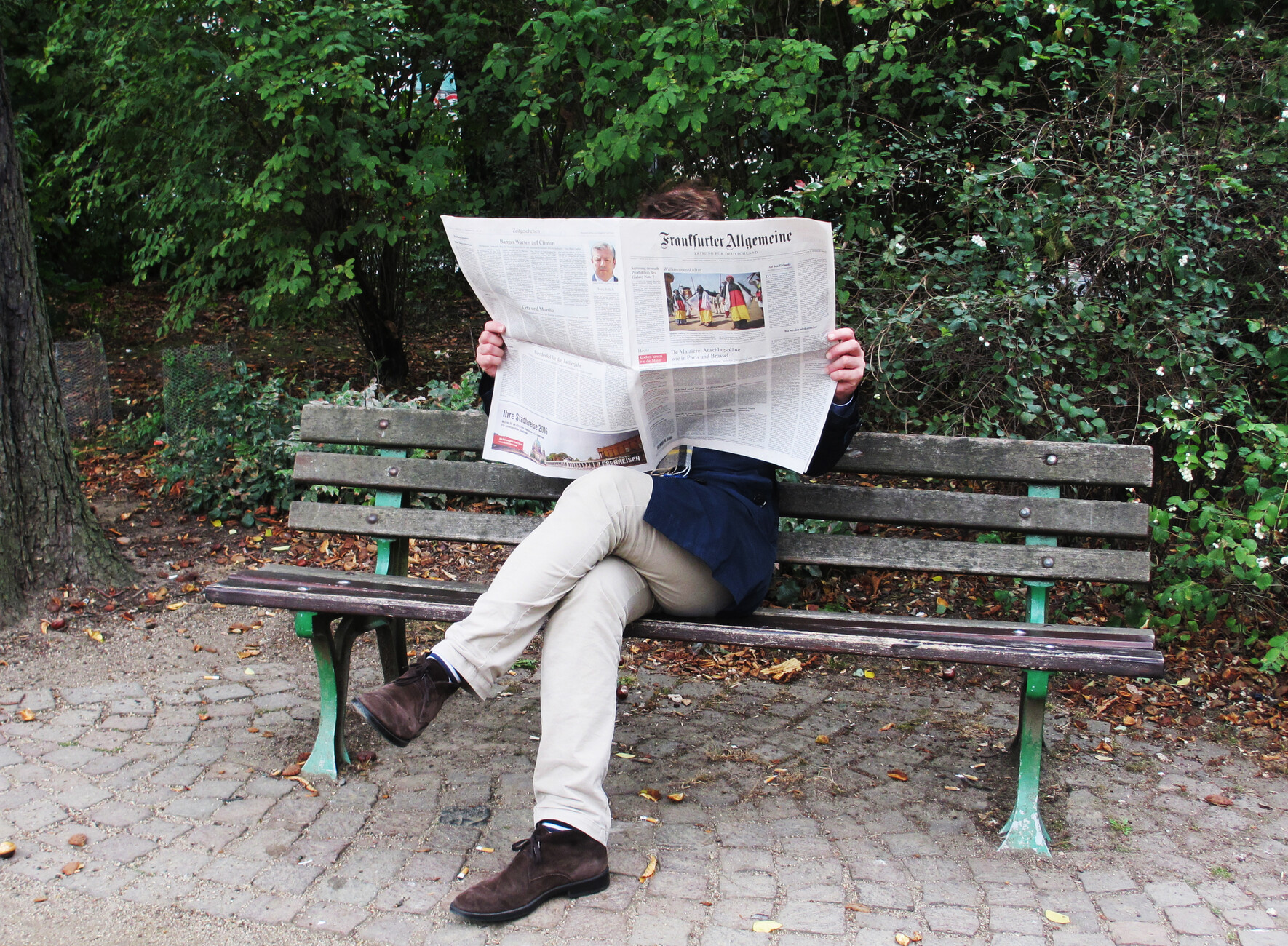Reading educates 03
The intellectual mind and world papers
It’s all pretty clear for Michael Angele: He believes Thomas Bernhard is the ideal newspaper reader. Him of all people, some may say, how marvelous others will say. Angele construes the “ideal newspaper reader” not just to be the person “who sits down in a café simply to read the paper irrespective of whether the café is in Vienna or in Gmunden.” When he speaks of the ideal newspaper reader he also means the person “who immediately leaves the café if he fails to find the newspaper there that he wants to read.” Which brings us back to Thomas Bernhard, who the author fells (no surprise that) is a bit of a crown witness as regards extreme newspaper readers, even if, as Angele notes, “sadly there is little research” on newspaper reading in Bernhard’s life and work.
The most famous story, as passionate as it is funny, about Bernhard’s zest or mania for reading newspapers is to be found in “Wittgenstein’s Nephew” and goes as follows: During the Salzburg festival Bernhard was hell-bent on reading an article in the NZZ, but the newspaper was not to be found in his hometown of Ohlsdorf, so he headed first for Salzburg, and then, on not finding it there, either, for Bad Reichenhall, drawing another blank, followed by Bad Hall and finally Steyer. By the end Bernhard had driven round all of Upper Austria. Whereby, so Angele suggests, what readers may remember of Bernhard’s autobiographical record is less the drive and more the sentence that “an intellectual mind cannot exist somewhere where the Neue Zürcher Zeitung is not available.”
Which would beg the question, irrespective of the situations and experiences the newspaper-reading man about town Angele then writes or the stories about newspaper readers he tells, whether, if the NZZ were to be available everywhere and at all times, there would still be intellectual minds, “as the mind can only evolve if there is a lack, an absence, a delay.” Today, in the digital age, things are of course different. Moreover Angele also considers Thomas Bernhard the ideal newspaper reader because he did not just read a paper to glean information, “but because he also read it to marvel, to get annoyed (above all the latter).” And precisely that is what reading newspapers is about, about marveling, being annoyed or inspired.
Angele is by no means pessimistic as regards our cultural future, nor is he suffused with melancholy. He tells why reading newspapers is an addiction and the art of agitation, why it is important that a newspaper is not simply there, but has to be found and bought; that, when we read a newspaper, we rarely read everything, but skip articles, and why delaying the reading and collecting newspapers leads to a special culture so utterly unlike reading online. And he describes why someone vacationing reads old newspapers or magazines, how a newspaper broadens your horizon and why reading a newspaper can slow the pace of life down.
However, his trip through the world of newspapers has a certain melancholic touch after all. For it long since seems certain that at some point there will be no salvation for the varied world of German newspapers. Angele makes no bones of what he thinks about the omnipresent “trend toward complete comprehensibility”, why assistance in understanding is the death of the passion of reading papers, and why neither style pages nor renaming the society section “life” will changes things in any way. Why, Angele asks, does the “ad for the ‘Zeit’ not read ‘read Zeit’, and instead ‘experience Zeit’ as if reading itself were not enough, but a holistic experience appealing to all the senses is required, the equivalent of a wellness weekend.”
Anyone who still reads several dailies and weeklies already notices how all of them tend to work more or less the same themes as the online media. And Angele thus summarizes what gets lost with the end of newspaper readers as a life-form – starting with the café atmosphere and the marvelous camouflage a newspaper offers a people-watcher, or the daily as the subject of discussion at the breakfast table, through to a feeling of cosmopolitanism: “Globalization destroys the milieus, the cosmopolitan transcends them.”
In all this, what proves to be a real advantage is the fact that Michael Angele knows the ins and outs of both words, is experienced in both print and online media alike. He worked on the Berlin desk for the F.A.Z., was one of the two editors-in-chief of “Netzzeitung” and is now deputy chief editor of the weekly, “Der Freitag”. His book is consciously not just another defense of the printed newspaper from the viewpoint of a professional scribe, but a subtle homage to the newspaper reader and the intellectual and at times decidedly bizarre milieu in which so much more arouses than the wish to simply acquire some information or other at short notice.
Michael Angele
Der letzte Zeitungsleser
160 pages, hb.
Galiani Verlag Berlin
ISBN 978-3-86971-128-7
EUR 16.00

